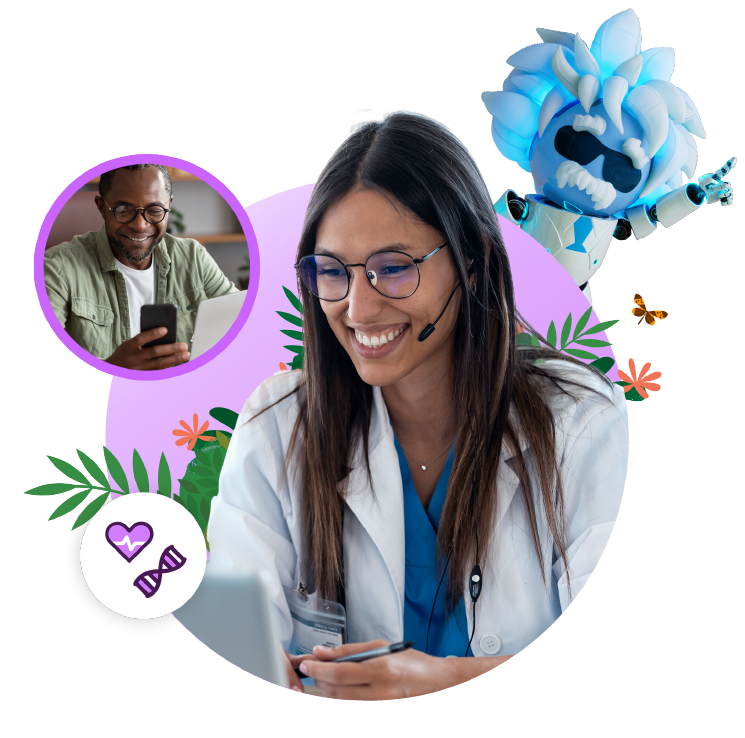How AI Agents Help Providers Boost Operational Efficiency and Improve Patient Care



AI agents can help healthcare organizations enhance experiences and efficiency with autonomous, intelligent, always-on support.
Providers are increasingly facing challenges when it comes to delivering high quality patient care. An aging population and workforce shortages are straining administrative resources and contributing to provider burnout. A staggering 87% of healthcare workers admit they work late each week just to complete their administrative duties. But what if our healthcare workforces had unlimited capacity? Enter agentic AI.
Agentic AI combines the adaptability of large language models (LLMs) with the accuracy of traditional programming. These AI agents are designed to reach specific goals and reasons through their actions to make better decisions. This allows AI to work independently and support healthcare workers by handling administrative tasks, which helps them focus on what matters most: their patients.
Take a closer look at how agentic AI is transforming the healthcare industry, addressing key areas such as administrative workload, data-driven decision-making, and care coordination, while ensuring trust and compliance in every step of the process.
87%
of healthcare workers admit they work late each week just to complete their administrative duties
Automate administrative tasks to free up provider time.
Doctors, nurses, care coordinators, contact center reps, and other members of the care team often spend hours on paperwork, and routine tasks such as insurance verifications, and scheduling, leaving less time for patient care. Tedious work that takes them away from patients, lowering the quality of care they can provide and hurting the patient experience, all while leading to staff burnout. But AI agents are ready to take some of that administrative burden off the human workforce by automating routine administrative tasks.
For instance, they can quickly summarize patient history, verify insurance coverage and eligibility, match patients with the right provider, book appointments instantly and respond to related inquiries, processes that traditionally require extensive manual checks and switching between multiple systems. This can lead to resolving issues faster, increased patient recruitment, improved care and patient experiences at lower costs, and less time spent on administrative tasks. Healthcare workers are on board with using AI, too. They expect agents to slash manual administrative tasks and streamline care by 33%.
Enhance care coordination and efficiency through better data and automation.
When it comes to patient care, time is of the essence. AI agents can give providers access to clearer information, higher-fidelity data, and easier ways to coordinate care with all relevant teams. They do this by seamlessly integrating both clinical and non-clinical data in real time from multiple sources, such as electronic health records (EHRs), medical devices, and patient portals. This integration creates a centralized repository, giving providers a comprehensive and complete view of patient information. With all data in one place, healthcare professionals can quickly access critical details, reducing the time it takes to find information, identify insights, and act upon them. Humans working with AI agents means patients receive the care and attention they need when they need it. They can even go a step further and help patients stay or get back on track, increasing the chances for better health outcomes. Here are three examples of how healthcare organizations are using AI agents today.
Make more informed and timely care decisions with unified data.
A top-ranked academic health system in Chicago is taking advantage of technology to break down data silos, enable system-wide consistency, and support purpose-driven experiences that unify each touchpoint. The unified platform allows both human personnel and AI agents to quickly access and analyze patient data, providing healthcare providers with up-to-date information. This real-time access ensures that doctors and nurses make informed decisions, reducing the time spent on data collection and verification. With immediate insights, care teams can respond swiftly to patient needs, enhancing the quality and timeliness of care.
70%
of healthcare workers say they want to use agents at work
Provide patients with 24/7 non-clinical support.
Questions from patients may arise at times when care team personnel are unavailable. AI agents, however, can provide support even when clinics or hospitals are closed. Another leading Chicago-based academic health system, for instance, has integrated a digital labor platform into the organization’s non-clinical workflows to provide patients with around-the-clock support. AI agents can address routine inquiries at all hours, enhancing the overall patient experience with timely support while at the same time offloading high-volume inquiries from staff so they can focus on more complex tasks.
Deliver care at scale with AI agents.
A healthcare organization focused on chronic disease management aims to improve diabetes care and accessibility for everyone, especially in underserved areas. Their personalized support model has shown great success at a small scale, but to expand their support nationally, they needed to integrate their systems and streamline workflows to ensure real-time access to patient data and speed up the process of securing insurance coverage.
With Agentforce, they will transform how they provide diabetes care by automating routine tasks and offering 24/7 support. This will save them about $80,000 per year for every 5,000 patients in administrative costs. Agentforce enables daily interactions with patients, turning infrequent doctor visits into a continuous conversation that helps manage A1C levels and overall diabetes care. By keeping patients engaged and motivated, it will support small, consistent lifestyle changes that lead to faster and better health outcomes.
Prioritize trust and compliance when choosing your agentic AI solution.
When your organization is ready to take the next step with AI and agents, there are a few important things to consider. Protecting patient data and remaining compliant with stringent industry regulations like HIPAA and GDPR should be a top priority. A solution like Agentforce is designed with robust security measures to protect patient data, ensuring that all information remains confidential, secure, and aligns to the highest ethical standards. This commitment to data security and ethical considerations is essential in building trust with patients and providers, who rely on the integrity and privacy of sensitive health information.
Another factor to consider is transparency. Agentforce operates within clear guardrails, providing detailed logs and explanations for every action taken. This transparency ensures that both patients and providers understand how decisions are made, fostering a sense of trust and reliability. Clear communication about AI processes is crucial for widespread acceptance and effective use. Patients and providers can have confidence in the technology, knowing that it is designed to build trust by supporting their needs and enhancing the quality of care.
Build healthier connections with Agentforce for Healthcare.
AI is no longer a nice-to-have but rather a necessity. Thinking about how to get started with AI can feel overwhelming. Discover how organizations are using Agentforce for Healthcare to keep up with aging populations, rising costs, and evolving patient demands by incorporating AI into daily processes.
Enhance experiences and efficiency with autonomous, intelligent support.
Explore how healthcare and life sciences organizations are taking advantage of AI to enhance patient, provider, member, and customer experiences by augmenting care teams, clinicians, and field reps with digital labor.










